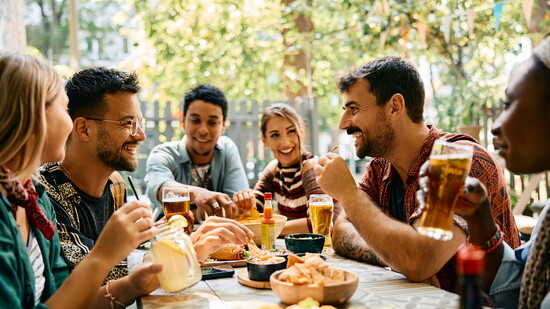Food is more than fuel. It’s tied to our emotions, memories, and sense of self. But when stress, guilt, or unrealistic expectations creep in, that connection can become complicated. To shed light on building a healthier mindset around food, we asked two licensed therapists—Heidi Conlin, M.S., LPC, LMFT, Mental Health and Nutrition Clinical Specialist, and Sam Warren, LPC, at Genesis Counseling Center—to share their insights on mindful eating, body image, and creating a balanced, compassionate approach to nourishment.
genesiscounselingcenter.com/texas-boerne | 830-967-7422 | 101 Woods of Boerne Blvd., Ste. 200
(Responses edited for length and clarity.)
What are common, unhealthy ways people relate to food?
Warren: There are several common ways. Emotional eating, where people use food to cope with emotions like stress, sadness, or boredom, rather than eating for physical hunger. Restrictive dieting involves severely limiting food intake, which can negatively impact health and well-being by creating nutrient deficiencies. I see controlling behaviors, whether that’s trying to use food as a means of self-control or as a means of controlling the behavior and emotions of others. Some use food as a reward or obsess over certain foods. Even binge eating can be an effort to control. Also, some people eat a lot of “junk food” that has few positive health benefits. Foods high in sugar or carbohydrates can result in excess, unproductive calories.
Are there strategies you suggest for coping with stress in a healthier way?
Conlin: Healthy coping tools can include physical things like movement, breathing exercises, getting enough sleep, drinking water, and even taking a shower. Also, mental activities like doing something creative, connecting with others, and focusing on God can be very helpful.
Unhealthy relationships with food can correlate with unhealthy perspectives on our bodies or ourselves. What approaches do you recommend for working through these types of issues?
W: I encourage people to find knowledgeable and trusted friends, pastors, or professional caregivers who can help guide them to the changes they want to make. It’s important to make a commitment to the changes in your life that are needed and desired. This journey of personal change often becomes a spiritual discovery process. Make sure you have an advisor who can offer spiritual guidance as well.
How can our relationship with food affect our relationships with other people?
C: Living a healthier lifestyle—including incorporating a healthier relationship with food—helps us connect better with others. When we take better care of ourselves, we are better able to care for others in our lives.
Are there any general strategies you recommend for creating and maintaining a healthy relationship with food?
W: I like to recommend four elements to any strategy:
- Set “SMART” goals—specific, measurable, achievable, realistic, and time-bound.
- Exercise grace and be kind to yourself. Changes need time to take hold.
- Be bold. It takes bravery to let go of anxiety and the fear of change.
- Find and utilize support. Identify a parent, friend, group, or counselor who can encourage and sustain you on the journey to healthy life changes.
Describe what a healthy relationship with food looks like.
C: Eating with balance is most important, incorporating complex carbs, protein, and fruits and vegetables. There are times when eating dessert or foods that do not fit into this frame are fun to eat and enjoyable, and I believe it’s important to include them, too, in order to find a healthy balance.
W: It looks like balanced, mindful eating. It includes flexibility and holding a non-judgmental attitude toward ourselves and others. It involves emotional awareness, where we can recognize and utilize things other than food to address negative emotions. It also includes the ability to enjoy food and find pleasure in planning and preparing it. Finally, a healthy relationship with food involves making social connections by sharing with others.
PULL QUOTE
“A healthy relationship with food includes the ability to enjoy food and find pleasure in planning and preparing it.” —Sam Warren, LPC
